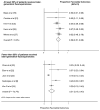Treatment outcomes among patients with extensively drug-resistant tuberculosis: systematic review and meta-analysis
- PMID: 20504231
- PMCID: PMC4013786
- DOI: 10.1086/653115
Treatment outcomes among patients with extensively drug-resistant tuberculosis: systematic review and meta-analysis
Abstract
Background: . The treatment of extensively drug-resistant tuberculosis (XDR TB) presents a major challenge. Second-line antimycobacterial drugs are less effective, more toxic, and more costly than first-line agents, and XDR TB strains are, by definition, resistant to the most potent second-line options: the injectable agents and fluoroquinolones. We conducted a meta-analysis to assess XDR TB treatment outcomes and to identify therapeutic approaches associated with favorable responses.
Methods: We searched PubMed and EMBASE databases to identify studies conducted through May 2009 that report XDR TB treatment outcomes.
Results: The search yielded 13 observational studies covering 560 patients, of whom 43.7% (95% confidence interval, 32.8%-54.5%) experienced favorable outcomes, defined as either cure or treatment completion, and 20.8% (95% confidence interval, 14.2%-27.3%) died. Random effects meta-analysis and meta-regression showed that studies in which a higher proportion of patients received a later-generation fluoroquinolone reported a higher proportion of favorable treatment outcomes (P=.012).
Conclusions: This meta-analysis provides the first empirical evidence that the use of later-generation fluoroquinolones for the treatment of XDR TB significantly improves treatment outcomes, even though drug-susceptibility testing demonstrates resistance to a representative fluoroquinolone. These results suggest that the addition of later-generation fluoroquinolones to XDR TB regimens may improve treatment outcomes and should be systematically evaluated in well-designed clinical studies.
Conflict of interest statement
Figures




References
-
- Centers for Disease Control and Prevention (CDC) Emergence of Mycobacterium tuberculosis with extensive resistance to second-line drugs—worldwide, 2000–2004. MMWR Morb Mortal Wkly Rep. 2006;55:301–5. - PubMed
-
- World Health Organization. Countries that had reported at least one XDR-TB case by end. Mar, 2009. [Accessed 17 November 2009]. http://www.who.int/tb/challenges/xdr/xdr_map_mar09.pdf.
-
- World Health Organization. Ebooks Corporation; 2008. [Accessed 17 November 2009]. Anti-tuberculosis drug resistance in the world, fourth global report: the WHO/IUATLD Global Project on Anti-Tuberculosis Drug Resistance Surveillance. WorldCat.org entry. http://www.worldcat.org/oclc/437123756&referer=brief_results.
-
- Kim HR, Hwang SS, Kim HJ, et al. Impact of extensive drug resistance on treatment outcomes in non–HIV-infected patients with multidrug-resistant tuberculosis. Clin Infect Dis. 2007;45:1290–5. - PubMed
Publication types
MeSH terms
Substances
Grants and funding
LinkOut - more resources
Full Text Sources
Other Literature Sources

